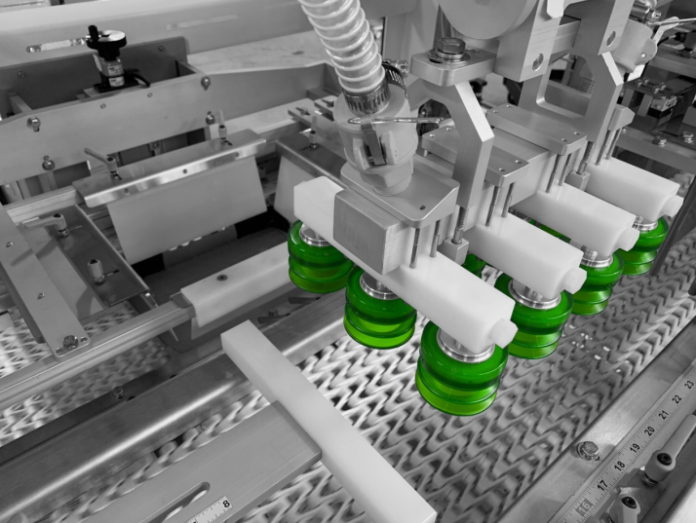Reducing costs and increasing efficiency and consistency depend on automation in the hectic fields of production and packaging. Driving the contemporary packaging sector are both robotic case packers and conventional case packers. These automated solutions guarantee great accuracy and speed and help businesses simplify their packaging operations. The benefits and variations between robotic and conventional case packers will be covered on this page.
What Are Robotic Case Packers?
Using robotic arms to choose, arrange, and pack goods into cases or cartons, robotic case packers are complex automation systems. To manage goods with great speed and accuracy, these systems depend on sophisticated vision technologies, artificial intelligence, and exact control systems. Robotic case packers adaptability to a broad spectrum of products—from delicate objects to oddly shaped goods allows them Food and beverage and consumer products companies, among others with a varied product line, find them perfect as they can quickly adapt to changing product criteria.
How Do Case Packers Work?
Compared to their robotic counterparts, traditional case packers work more mechanically. Products are loaded into pre-formed boxes using mechanical tools including conveyors and pushers in these systems. Designed for efficiency, they can rapidly handle vast numbers of goods. Although conventional case packers are not as adaptable as robotic case packers, in many packing situations, especially where the goods being packed are homogeneous in size and shape, traditional case packers remain successful. Companies with large volume, low-variation products often choose their simplicity and reduced starting costs.
The Advantages of Robotic Case Packers
Robotic case packers have one of the main benefits in handling a wide range of items with different forms, sizes, and materials. They are quite adaptable and able to change their packing techniques without resorting to significant equipment changes. Working with other robotic systems, conveyors, and packing equipment, robotic case packers can also be included in completely automated manufacturing lines. By streamlining the whole manufacturing process, this integration lowers labor costs, improves safety, and raises throughput.
Why Choose Traditional Case Packers?
Particularly in sectors requiring high-speed, repetitive activities, traditional case packers nevertheless have great advantages. Usually more reasonably priced in the short run than robotic case packers, these machines are perfect for companies with tighter budgets. Product uniformity in shape and size, that is, bottles, cans, and cartons, allows case packers to handle them efficiently. Perfect for companies concentrated on mass production, their mechanical systems are sometimes easier to maintain and provide great throughput.
Efficiency and Precision with Robotic Case Packers
Robotic case packers give producers the capacity to satisfy high demand packaging needs since they shine in speed and accuracy. These technologies boost production productivity and lower labor costs by allowing constant operation free from breaks. Furthermore, their accuracy guarantees proper packing of every product, therefore minimizing waste and preventing damage of products. Robotic case packers reduce human mistakes by automating the packing process, therefore improving the quality of the products and guaranteeing more consistent packaging.
The Role of Case Packers in Packaging Operations
By automating the chore of product placement into cartons, case packers significantly help to simplify packing operations. Whether robotic or conventional, case packers lower the demand for human labor, increase throughput, and guarantee effective and safe packing of products. Case packers give companies hoping to increase production the dependability and speed required to satisfy rising needs. Higher production levels can be attained by businesses streamlining the packaging process while preserving product quality and lowering running expenses.
Conclusion
To sum up, for contemporary packaging requirements, both robotic and conventional case packers present worthwhile alternatives. While conventional case packers offer dependability, speed, and cost-effectiveness, robotic case packers give flexibility, precision, and the capacity to manage many product varieties. The proper solution will depend on particular company requirements, product categories, and financial constraints. For additional specifics on case packing technology. Choosing the right method will help any company greatly increase packing efficiency and output.




